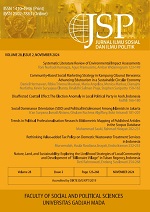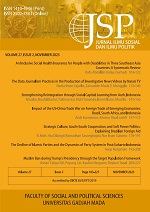The Two Edge Knife of Decentralization
https://doi.org/10.22146/jsp.10927
Ahmad Khoirul Umam
(1*)
(1) Universitas Paramadina
(*) Corresponding Author
Abstract
A centralistic government model has become a trend in a number of developing countries, in which the ideosycretic aspect becomes pivotal key in the policy making. The situation constitutes authoritarianism, cronyism, and corruption. To break the impasse, the decentralized system is proposed to make people closer to the public policy making. Decentralization is also convinced to be the solution to create a good governance. But a number of facts in the developing countries demonstrates that decentralization indeed has ignite emerges backfires such as decentralized corruption, parochialism, horizontal conflict, local political instability and others. This article elaborates the theoretical framework on decentralization's ouput as the a double-edge knife. In a simple words, the concept of decentralization does not have a permanent relationship with the creation of good governance and development. Without substantive democracy, decentralization is indeed potential to be a destructive political instrument threating the state's future.
Keywords
decentralization; substantive democracy; governance; social capital; desentralisasi; demokrasi substantif; pemerintahan; kapital sosial
DOI:
https://doi.org/10.22146/jsp.10927
Article Metrics
Abstract views : 2582
|
views : 1945
Refbacks
There are currently no refbacks.
Copyright (c) 2016 Jurnal Ilmu Sosial dan Ilmu Politik
<div class="statcounter"><a title="Web Analytics" href="http://statcounter.com/" target="_blank"><img class="statcounter" src="//c.statcounter.com/10932543/0/2e122c85/0/" alt="Web Analytics"></a></div> <div class="statcounter"><a title="Web Analytics Made Easy - StatCounter" href="http://statcounter.com/" target="_blank"><img class="statcounter" src="//c.statcounter.com/10932543/0/2e122c85/0/" alt="Web Analytics Made Easy - StatCounter"></a></div> View My Stats























